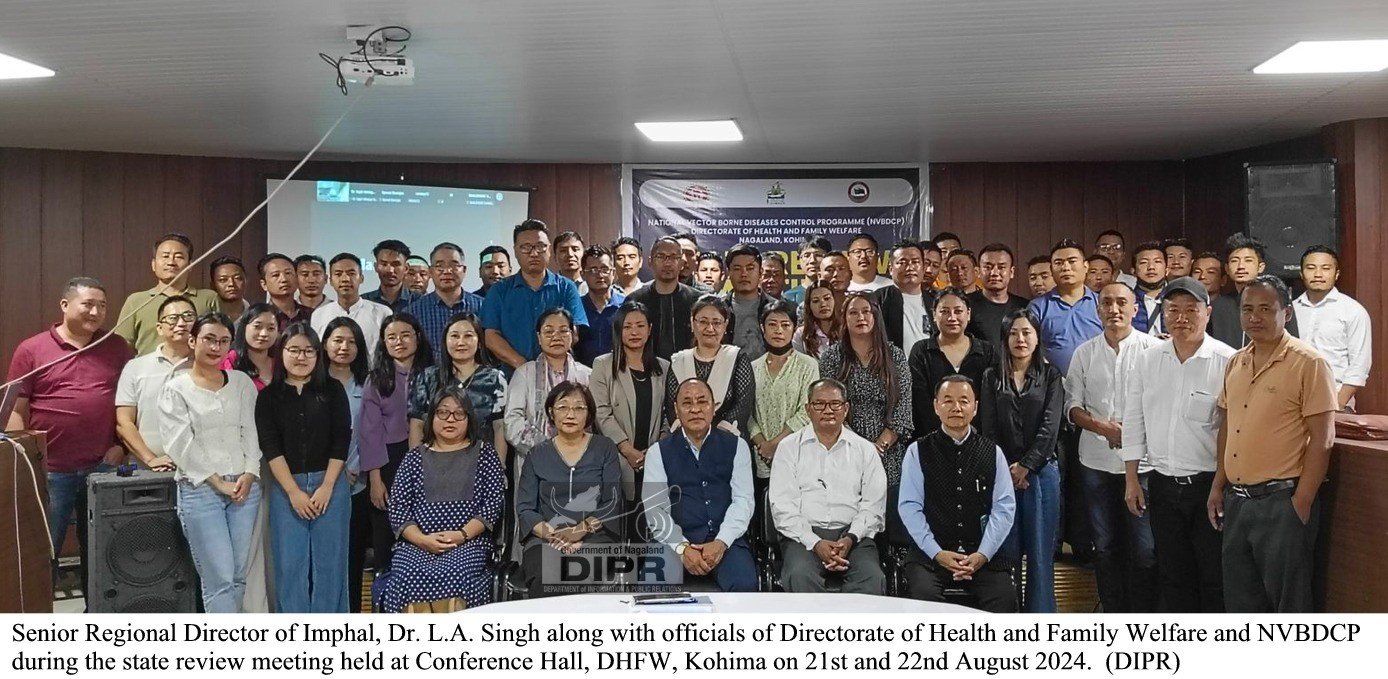The National Vector Borne Disease Control Programme (NVBDCP), Nagaland held a two-day state review meeting at the DHFW conference hall on 21st and 22nd August 2024.
In his opening remarks, Principal Director of the Directorate of Health and Family Welfare, Dr. E. Motsuthung Patton, highlighted the near-elimination of malaria in many districts. He cautioned against complacency, particularly in light of the dengue fever outbreak last year in Dimapur and Mon. Despite a current decrease in cases, he urged vigilance with the onset of the monsoon season. Dr. Patton expressed gratitude to the NVBDCP staff for their efforts in controlling dengue fever and emphasized the importance of awareness and source reduction in preventing vector-borne diseases.
Dr. Patton underscored the value of the review meeting for reflecting on past actions and planning future strategies. He requested the NVBDCP staff to maintain sincerity and diligence in their work towards achieving malaria elimination.
Joint Director & SPO of NVBDCP, Dr. Neisakho Kere, provided an overview of NVBDCP’s performance in Nagaland. As of 2023, all districts had an Annual Parasite Incidence (API) of less than 1, which is commendable. However, he expressed concern over the Annual Blood Examination Rate (ABER), which fell short of the national target of 10%. Despite a slight increase from 9.53% in 2022 to 10.12% in 2023, the rate has declined this year. Dr. Kere called for intensified efforts to meet the target.
Dr. Kere noted that no cases of Kala-azar, or Filariasis had been detected. He suspected there may be more cases of Chikungunya in the state since there is not much sample collection for testing.
Therefore, Dr. Kere advised DVBOs to alert Medical Officers if they suspect any symptoms of Chikungunya and to collect samples for testing in Kohima and Dimapur.
He also reported a significant decrease in malaria cases, from 113 in 2018 to 6 so far in 2024, and a reduction in dengue cases from 4,943 in 2023 to 11 this year. For Acute Encephalitis Syndrome, 19 cases were reported in 2023 compared to 8 this year. Dr. Kere recommended improving blood slide collection, enhancing MBER across all districts, and ensuring quality monitoring. He urged districts to submit slides for cross-checking monthly and to conduct regular IEC/BCC activities.
Senior Regional Director of Imphal, Dr. L.A. Singh, discussed the malaria certification documentation process. He explained that WHO grants certification of malaria elimination to a country following a request from its government, provided it has demonstrated no indigenous malaria cases for at least three consecutive years and has a prevention program in place. The Malaria Elimination Certification Panel (MECP) reviews the report and conducts an independent evaluation, including field visits and interviews with relevant health sectors. The WHO Director-General makes the final certification decision.
Dr. Singh congratulated the NVBDCP staff for their hard work, noting that malaria cases in Nagaland are among the lowest in the country. He emphasized that maintaining these achievements is challenging and urged continued efforts until malaria is fully eliminated. He also stressed the importance of surveillance, particularly for migrant laborers, travellers, and refugees.
According to entomology reports, most areas in Nagaland are free of vectors, with exceptions in some regions, he said and urged districts to maintain their good work to achieve malaria elimination certification. Dr. Singh highlighted that malaria cases can occur due to imported parasites, vectors, or environmental factors that sustain transmission, and called for focused surveillance and control efforts.
NVBDCP staff from 11 districts presented their performance reports during the meeting, which was also attended virtually by National Consultants from NCVBDC, Government of India. Director (Health) DHFW, Dr. R Chubala Aier also attended the meeting. The meeting was chaired by Deputy Director of NVBDCP, Dr. Tinurenla Anichari and the vote of thanks was pronounced by Public Health and Training Consultant NVBDCP, Imsubenla.


